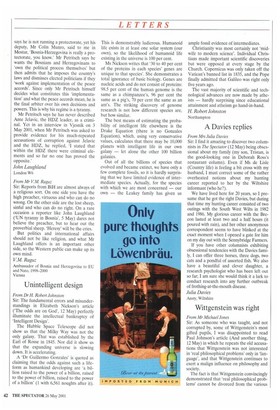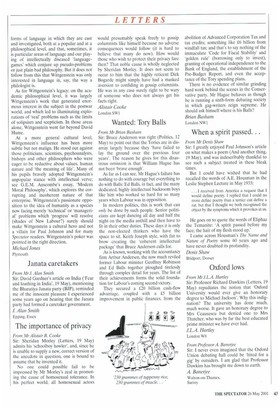Wittgenstein was right
From Mr Michael Jones Sir: As someone who was taught, and not corrupted by, some of Wittgenstein's most gifted pupils, I was disappointed to read Paul Johnson's article (And another thing, 12 May) in which he repeats the old accusations that Wittgenstein was not interested in 'real philosophical problems' only in 'language', and that Wittgenstein continues to exert a malign influence on philosophy and society.
The fact is that Wittgenstein convincingly demonstrated that 'real philosophical problems' cannot be divorced from the various forms of language in which they are cast and investigated, both at a popular and at a philosophical level, and that, sometimes, it is particular areas of language and our playing of intellectually diseased 'languagegames' which conjure up pseudo-problems or just plain bad philosophy. But it does not follow from this that Wittgenstein was only interested in language in, say, the way a philologist is.
As for Wittgenstein's legacy: on the academic philosophical level, it was largely Wittgenstein's work that generated enormous interest in the subject in the postwar world, and which led to illuminating explorations of 'real' problems such as the limits of solipsism and scepticism. In those areas alone, Wittgenstein went far beyond David Hume.
At a more general cultural level, Wittgenstein's influence has been more subtle but not malign. He stood out against those politicians, scientists, psychoanalysts, bishops and other philosophers who were eager to be reductive about values, human nature and 'the meaning of life'. Many of his pupils bravely adopted Wittgenstein's unpopular stance with intellectual verve; see G.E.M. Anscombe's essay, 'Modern Moral Philosophy', which explores the corrupting and incoherent nature of that enterprise. Wittgenstein's passionate opposition to the idea of humanity as a species now facing merely 'technical' or 'managerial' problems which 'progress' will resolve (shades of New Labour?) surely should make Wittgenstein a cultural hero and not a villain for Paul Johnson and for many Spectator readers. Wittgenstein's poker was pointed in the right direction.
Michael Jones
Plymouth



















































































 Previous page
Previous page